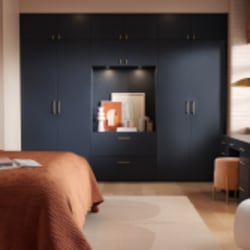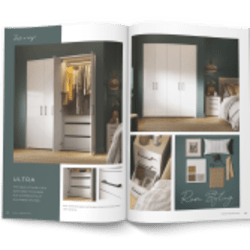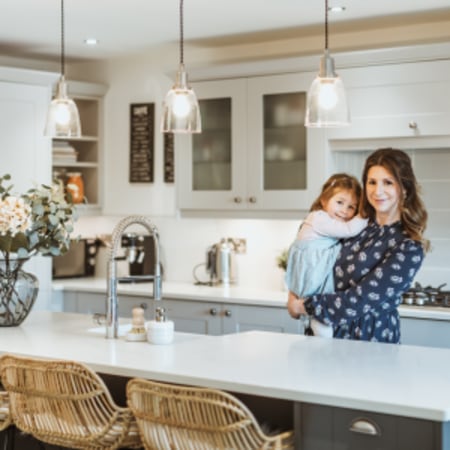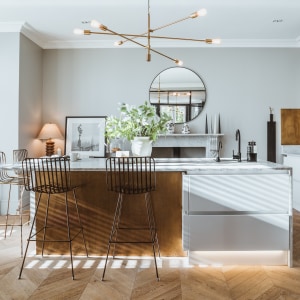Wine Coolers: Buying Guide
Wine Coolers
Nothing says relaxing like that perfectly cooled glass of wine. Whether it’s celebrating the start of the weekend with a Merlot, or merely enjoying a Sauvignon-Blanc with dinner, many of us love to take the edge off with a drink. But if you’re a wine enthusiast, how do you keep your wine at the ideal temperature for serving and storage? Yes, you can get away with using your fridge-freezer - or you could invest in a dedicated wine cooler, or wine fridge.
But what is a wine cooler? Unlike a typical fridge-freezer, a wine cooler is a dedicated cooling appliance designed to keep your wine at its specifically recommended temperature, using internal computers to maintain a stable temperature distribution and keep your wine fresh.
Investing in a wine fridge ensures your wine will always have a full-bodied flavour while also positioning your bottles in such a way as to prevent their corks from drying out. Not only that, but their modern finish and advanced technical features allow a wine cooler to bring an air of sophistication and class to any kitchen. Nothing will make your guests ooh and ahh over your kitchen more than a built-in wine fridge!
Much like a coffee machine is a must-have appliance for anyone who loves that perfected morning brew, a wine fridge is a worthwhile accompaniment for those who like to store and drink wine regularly.
However, in the same vein as buying a coffee machine or similar kitchen appliance, there are a number of things you should consider when buying a wine cooler. To make this easier, we’ve constructed this thorough wine cooler buying guide. We’ll walk you through all the details you’ll need to know in order to buy the best wine cooler for your kitchen, regardless of whether it’s contemporary or traditional style.

Before you start
In many ways, preparing to buy a wine cooler is no different to preparing to buy an oven or a dishwasher. You still need to account for the size of the appliance and how big of a space you’ll need to place it, as well as how energy efficient it will be and how big a budget you’ll need.
Think carefully about the factors we’ll discuss below in order to give yourself a thorough understanding of what’s required when you buy a wine cooler. With this knowledge at hand, you’ll have no trouble picking up the best wine cooler for your home.
Size
An incredibly important factor to consider when buying a wine cooler, size relates not only to how big the appliance is but also its bottle capacity. Generally speaking, upright models are better for larger and open kitchens, while under-counter or slim fit variations can integrate seamlessly into smaller spaces.
Naturally, different types of wine coolers have varying bottle capacity, from a minimum of 6, all the way up to 140 or more. So, in order to choose the best wine cooler for you, you need to consider how much wine you have; and more importantly, how much you plan on storing it.
Of course, it’s difficult to know exactly how much this is, but experts recommend coming up with a rough number and then increasing that by 50%, especially if you plan on storing lots of wine. We all know that around birthdays and Christmas, if your friends know you’re a wine fan, you’re likely to end up with plenty of extra bottles, so make sure you have enough room!
When it comes to the actual size of a wine fridge, as with your washing machine and oven, you’ll need to know the dimensions of both the wine cooler and where you want to place it. The largest freestanding models can be as tall as 185cm, while most built-in designs typically won’t be taller than 90cm. As for width and depth, the majority of wine coolers won’t exceed 60cm in both areas, ensuring they can fit perfectly beside your kitchen cabinets.

Budget
The price of wine coolers is dictated primarily by their bottle capacity, though height and the addition of double doors will also add to the cost. Unlike your washing machine and sink, wine fridges are not usually considered a necessary kitchen appliance. This means the best wine coolers can be rather expensive.
In fact, the cost of a wine cooler can vary dramatically, being anywhere from as little as £100 to potentially over £1,500. That being said, most homeowners won’t require a 100+ bottle wine cooler, making the average wine cooler cost between £400 and £600.
Location
Location is another very important factor you’ll need to consider when you buy wine coolers. All refrigerators need to be placed on a hard, flat, and stable surface. This will avoid your wine moving unnecessarily and prevent any unfortunate disasters, such as your fridge falling over or any internal sediment spoiling the wine’s flavour.
Alongside this, you should ensure your cooler sits out of direct sunlight in a room with a fairly consistent temperature for maximum efficiency. Direct sunlight can play havoc with a wine cooler’s temperature and potentially ruin the quality of your wine. This is actually one of the main reasons why many places still have wine cellars, and naturally, you can store your wine fridge in a cellar if you have one.
Lastly, wherever you place your wine cooler, it needs to have room for plenty of air circulation. A few centimetres should be left at the back and top, as well as the sides if possible so that your wine cooler can suck in and vent the necessary air it requires to function correctly.
Temperature zone
While not directly related to the position of your wine fridge, knowing about the various temperature zones will not only make it easier to decide which types of wine coolers you could buy but also how to correctly store them.
Firstly, do you intend to store one or multiple types of wine? If you only intend to drink red or white exclusively, then a single temperature zone wine cooler will be suitable for storage and serving.
If, on the other hand, you like both red and white wines, then a dual temperature zone wine cooler will separate the wines while ensuring both remain at perfect serving temperature. Dual zones are more expensive, but they provide greater storage flexibility.
Having the correct temperature is so important when storing wine - in fact, specific temperatures have actually been proven to enhance the flavour of a wine. To ensure your wine is stored correctly, white wines should be kept at a low 9-13 degrees while red wines should sit at a more comfortable 12-15 degrees. If you’re a real wine aficionado, then making sure that both your reds and whites are stored properly is going to be essential, which is where a dual zone cooler is going to be a huge help.
Energy rating
Knowing your wine fridge’s energy rating is a good way to see how efficient it is. A better energy rating will save you money in the long term on bills, leaving more money to spend on wine. The best wine coolers might have an energy rating as high as A, but most will sit in the C to E range.
Types of wine coolers
As we’ve previously mentioned, there are two types of wine coolers for you to choose from when buying a wine cooler. Both freestanding and built-in models perform the same function, so your choice will relate more to where you want your cooler to go and your available budget.
Freestanding
Freestanding wine coolers are the cheapest option available when choosing between the two different types of wine coolers you can choose. More widely available than built-in designs, they can be put anywhere, though tend to be taller and wider in their dimensions. This makes a freestanding model better for large spaces or use in a cellar or utility room.
However, while freestanding models tend to give you greater bottle capacity, you’ll need to leave plenty of space around one for venting efficiency purposes.
Built-in
Alternatively, built-in wine coolers are the ideal option if you want a wine fridge that will blend seamlessly into any kitchen style or finish. After all, when you buy a wine cooler, or any kitchen appliance, the last thing you want is an aesthetic clash.
However, built-in wine coolers will almost always have a smaller bottle capacity, therefore making them better suited for those who like a crisp wine with dinner rather than storing them long term. They also tend to be more expensive than freestanding options due to their installation costs.
Wine cooler features
No good kitchen appliance would be complete without a huge selection of special features and additions. While some fancy features might be optional on appliances like microwaves, many of the features listed below are must-have options to keep your wine full-bodied and fragrant.
Moveable shelves
A useful addition to any storage unit, moveable shelves are ideal if you need to store larger bottles or make space with wider gaps. Most wine bottles come in the standard Bordeaux shape, but if you need to store something like champagne for a special occasion, movable shelves let you do so without rearranging your collection unnecessarily.
UV-resistant doors
As stated, sunlight can have very negative effects on wine. If you buy a wine cooler with a glass door, be sure to find one with UV-resistant glass. Not only will this protect your wine from harmful UV rays, but you can also show off your wine collection safe in the knowledge that it’ll taste as good as it looks.
LED lights
A small feature but one that’s handy to have. The addition of interior LED lights allows you to light up your wine fridge’s interior and favourite bottles without exposing them to excessive heat. Handy if you have so many bottles you can’t remember just where that 2016 vintage red was stored…
Anti-vibration system
You might not be aware, but all wine actually has a fine layer of sediment at the base of the bottle. This is a natural part of the creation process, but if the sediment gets disturbed, it can affect the flavour of the wine.
Buying a wine cooler with an anti-vibration system will ensure that this doesn’t happen. Using silicone-suspended compressors, the system will stop your bottles from moving as much as possible.
Humidity controls
Wine is very sensitive to low levels of humidity. When humidity gets too low, a wine bottle’s cork will begin to dry out, allowing air into the bottle which will ruin the wine. With humidity controls, you can monitor the internal humidity to ensure that your wine corks never dry out.
Charcoal air filter
Finally, charcoal filters are a great way to prevent odours from building up inside your wine fridge and potentially affecting the flavour. These filters are part of a wine cooler’s ventilation system and collect all the dust and dirt that might be sucked in. All you need to do to ensure maximum freshness is replace the charcoal filters every 6-12 months.
Where can I buy a wine cooler?
When deciding where to buy wine coolers, you have a choice between normal home retailers or going to specialist wine experts. When you buy a wine cooler with Wren Kitchens, our in-store experts will go through the buying process with you, so you buy the right wine fridge for your needs. Our selection of wine refrigerators can fit a variety of kitchen aesthetics, meaning you don’t need to worry about a style clash.
At Wren Kitchens, we’ve spent years helping our customers to create their dream kitchens, so we have plenty of experience in making a space that you’ll love to spend time in. Whether you want to use wine for cooking or entertaining, we can help you pick and choose the perfect wine cooler for your kitchen’s needs. Get in touch and book an appointment at your local showroom today to speak to one of our friendly experts, and we’ll help you to work out how we can build your dream kitchen.
If you want to fit your kitchen out with other must-have handy appliances, such as microwaves or new taps, you can find a range of kitchen and appliance buying guides right here. You can also head over to our inspiration section for even more tips and tricks for improving your kitchen.













